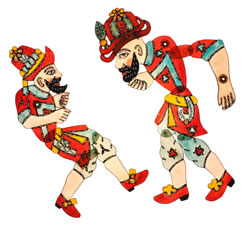News & Notices
Turkish Puppets to Star in Workshop
Who in the world are Karagöz and Hacivet? Traditional Turkish shadow puppets, that’s who. Come learn both how to make them and how to manipulate them with Turkish master puppet maker, Hakan Dundar at a Professional Development Workshop in Charlotte, North Carolina.

Learn how to create a version of Karagöz and Hacivat, two traditional Turkish shadow puppets, at a special workshop in Charlotte, North Carolina before the start of the USITT 2011 Annual Conference.
On the first day of his two-day workshop, scheduled for Monday, March 7 and Tuesday March 8, Mr. Dundar will explain the tradition of shadow puppetry in Turkey, which has existed since the 14th century. Participants will learn how to make these puppets from leather and create their own shadow puppets. On the second day, participants will finish and color their puppets. Then puppet master Alasehir Meriç will show how to manipulate the puppets, and the group will create their own puppet show. The puppet master is called a "hayali,"in Turkish meaning "imaginary" or "image creator."
The puppet theatre is called Karagöz, which means "black eye" and is named after the main character in the stories. According to legend, Karagöz is said to have begun in Bursa when two men working on construction of the great mosque in 1396 would perform impromptu comedy routines. The other workers enjoyed their performances so much that it slowed the progress of construction, and when the sultan heard of this situation, he condemned the two men, Karagöz and Hacivat, to death. The Karagöz stories are often based on social situations such as a contest or a business deal and the Karagöz puppet is often deceitful, lewd and a little violent—perfect skills to learn for an "image creator."
Mr. Meriç currently works as an actor and director with the Antalya State Theatre in Turkey. He teaches traditional Karagoz shadow puppetry in the Akdeniz University department of theatre and is a member of UNIMA and the International Children’s and Youth Theatre Union.
Mr. Dundar has worked as the set and costume designer for the State Theater of Turkey in Ankara. He has designed sets, costume, props, masks, and puppets for over 100 professional performances. His work was in the gallery section of World Stage Design 2005 in Toronto and he was a featured designer in the Turkish exhibit at PQ 2007. In addition to the PDW, Mr. Dundar will present a session for the Scene Design Commission on traditional Turkish shadow puppets 1 p.m. on Thursday, March 10 and another for the Costume Design & Technology Commission 9:30 p.m. on Friday, March 11. This session will explore the influence of traditional Turkish dress on contemporary costume design.

